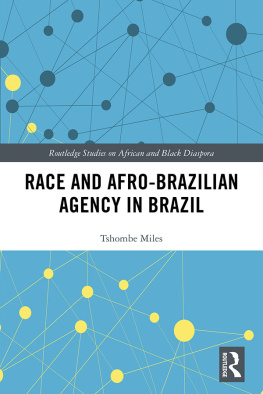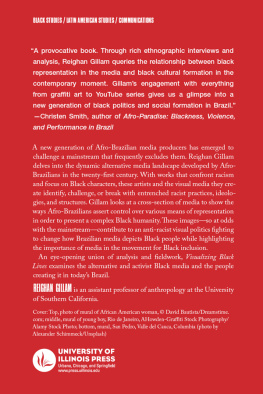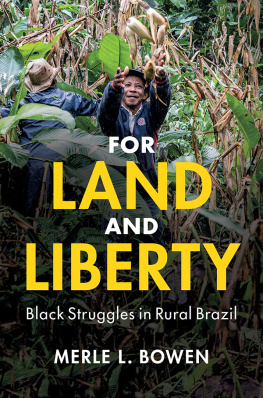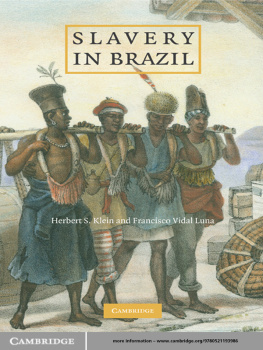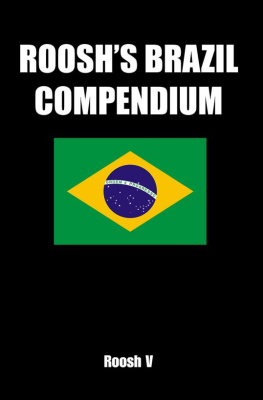Table of Contents
Guide
Print Page Numbers
Race and Afro-Brazilian Agency in Brazil
This book provides an insight into the Afro-Brazilian experience of racism in Brazil from the nineteenth century to the present day, exploring people of African ancestrys responses to racism in the context of a society where racism was present in practice, though rarely explicit in law.
Race and Afro-Brazilian Agency in Brazil examines the variety of strategies, from conservative to radical, that people of African ancestry have used to combat racism throughout the diaspora in Brazil. In studying the legacy of color-blind racism in Brazil, in contrast to racially motivated policies extant in the US and South Africa during the twentieth century, the book uncovers various approaches practiced by Afro-Brazilians throughout the country since the abolition of slavery toward racism, unique to the Brazilian experience. Studying racism in Brazil from the latter part of the nineteenth century to the present day, the book examines areas such as art and culture, politics, and tradition.
This book will be of interest to scholars and students of Brazilian history, diaspora studies, race/ethnicity, and Luso-Brazilian studies.
Tshombe Miles is an Assistant Professor of Black and Latino Studies at Baruch College, City University of New York, USA.
Routledge Studies on African and Black Diaspora
Series editors: Fassil Demissie
DePaul University
and
Sandra Jackson
DePaul University
Sex and Race in the Black Atlantic
Mulatto Devils and Multiracial Messiahs
Daniel McNeil
Representing the Black Female Subject in Western Art
Charmaine A. Nelson
Geographies of the Haitian Diaspora
Edited by Regine O. Jackson
Critical Perspectives on Afro-Latin American Literature
Edited by Antonio D. Tillis
Afro-Nordic Landscapes
Equality and Race in Northern Europe
Edited by Michael McEachrane
Pilgrimage Tourism of Diaspora Africans to Ghana
Ann Reed
The Poetics and Politics of Diaspora
Transatlantic Musings
Jerome C. Branche
Post/Colonialism and the Pursuit of Freedom in the Black Atlantic
Edited by Jerome C. Branche
Race and Afro-Brazilian Agency in Brazil
Tshombe Miles
Race and Afro-Brazilian Agency in Brazil
Tshombe Miles

First published 2019
by Routledge
2 Park Square, Milton Park, Abingdon, Oxon OX14 4RN
and by Routledge
52 Vanderbilt Avenue, New York, NY 10017
Routledge is an imprint of the Taylor & Francis Group, an informa business
2020 Tshombe Miles
The right of Tshombe Miles to be identified as author of this work has been asserted by him in accordance with sections 77 and 78 of the Copyright, Designs and Patents Act 1988.
All rights reserved. No part of this book may be reprinted or reproduced or utilized in any form or by any electronic, mechanical, or other means, now known or hereafter invented, including photocopying and recording, or in any information storage or retrieval system, without permission in writing from the publishers.
Trademark notice: Product or corporate names may be trademarks or registered trademarks, and are used only for identification and explanation without intent to infringe.
British Library Cataloguing-in-Publication Data
A catalogue record for this book is available from the British Library
Library of Congress Cataloging-in-Publication Data
A catalog record has been requested for this book
ISBN: 978-1-138-60724-8 (hbk)
ISBN: 978-0-429-46725-7 (ebk)
Typeset in Times New Roman
by Wearset Ltd, Boldon, Tyne & Wear
Contents
In many ways, this project like many ideas has been in my head for close to thirty years. Understanding how people of African ancestry continue to fight racism in a society that claims racism has mostly ended, since the United States post-civil rights period. Keeps excluding people of African descent and still maintains people of African ancestry disproportionately at the bottom of the society is something I have been wrestling with since I started to think about Brazil as an undergraduate in college. In many ways, I believe Brazil reminds me of the world in which I grew up as a young person in the United States. As a youth, I have been blessed to live in a multiple ethnic and racial world in which I never knew de jure segregation first hand. Quite the contrary, my world was Morningside Heights Manhattan in the 1970s and 1980s where I freely inter-mingled with the working-class and more solidly middle-class kids of all races and background. Whether it was with childhood friends Lucas whose parents were immigrants of Swiss/German extraction, or my friend Claudio from Chile, or Max and Karen from Haiti, or my friends at The Cathedral School who were mainly white with a sprinkling of black and other minority groups.
However, though I was deep friends with this group and treated with full acceptance, I did know racism first hand. In retrospect, I believe I often block those memories out of my head. I realize that racism is something that people of African ancestry experience in a variety of ways. I remember teachers ignoring me in the classroom and making me feel a sense of invisibility. Teachers and others assuming you are not quite as smart as them. One specific example that has always stayed in my head was the time I was detained in The Wiz, which was at that time a successful electronics/record store. I remember as a high school student spending hours at the record store, where I must have spent a good part of my allowance buying records. Therefore it was quite upsetting one day I went to the store with my white friend, being detained by the store clerk because they thought I stole something, and leaving my white friend free though we were together. Why did the sales clerk imagine I had taken something when I was a regular paying customer? Ultimately I knew why, my real question was how come he imagined all blacks as the same. Luckily I had parents who would not tolerate mistreatment of their children. My father marched down to that store and demanded they apologize. The store did apologize. It was the example of my mother and father that gave me the tools to navigate this kind of world and to be able to call out how racism worked in a post-civil rights era. It is in this regard my first thanks are to Mom and Dad. Mom and Dad are the inspiration and the source of my intellectual curiosity and my desire to make the world a more livable one.
It was as an undergraduate that I first took an interest in Brazil, and Dr. Marina Fernando, my first mentor, helped me realize that interest into a reality. Who knew as an undergraduate that I would one day pursue a career in the academy as it were! Beyond my parents and Dr. Fernando, there has been a long list of support and help.
Thanks are to the people at Brown University: Evelyn Hu-dehart, Doug Cope, Rhett Jones, and Anani Dzidzienyo. If I had not met these folks, there would be no Ph.D. and no real learning at Brown University. Evelyn offered me a room in her home and gave me mentorship and an academic space as well as taught me Latin American history. I will never forget her; she is a fantastic person. The others supported me as living and breathing intellectuals. They love to exchange ideas in their respective offices. I was fortunate to have independent studies with each one of these scholars. Imagine having the opportunity to read a book and then go to discuss it with the top scholar of the field for an hour or two each week.

